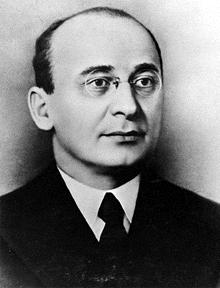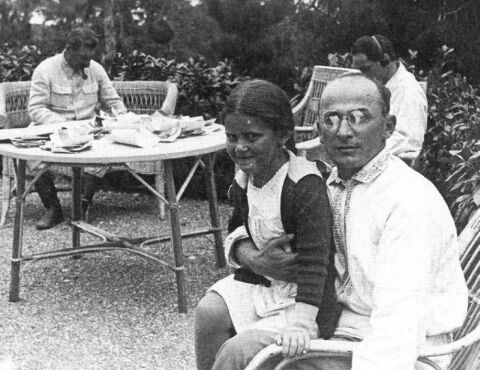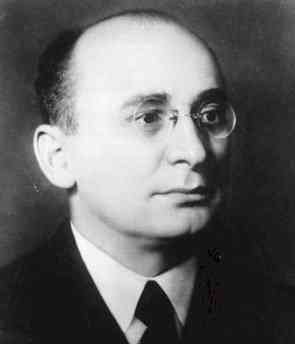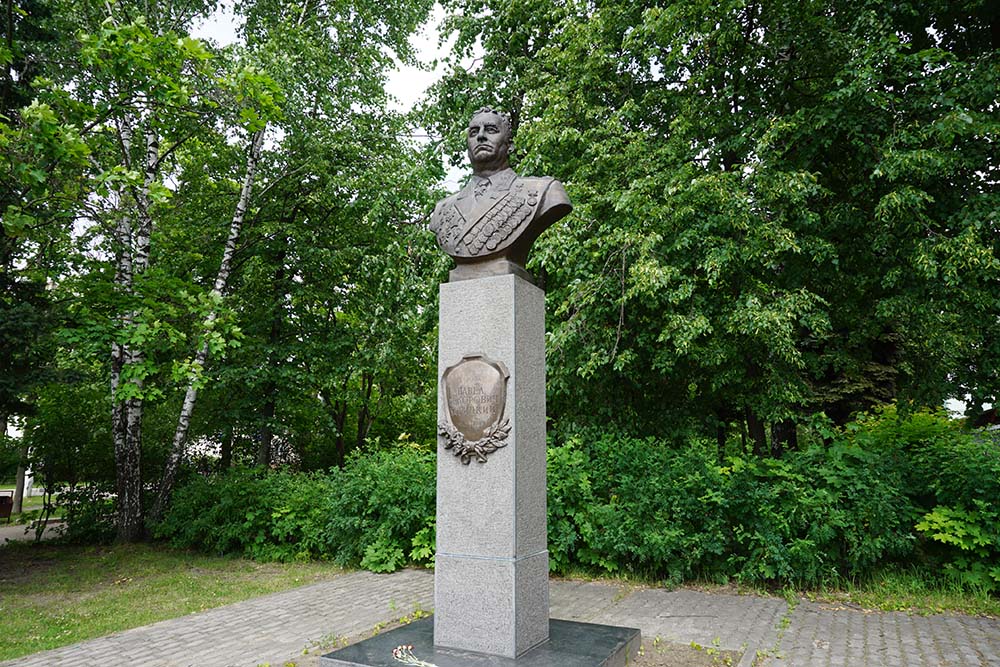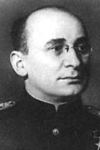Lavrenty Pavlovich Beria was born on March 29th , 1899 near Suchumi in Georgia. After the revolution he joined the Bolshevists at the age of 18. A few years earlier, Beria had left his parental home and he studied at the technical school in Baku in Azerbeidjan. The future chief of the NKVD graduated in 1919.
Two years later, his career got off to a good start when he joined the notorious secret service Cheka (Russian abbreviation for Extraordinary Committee for the Battle against Counterrevolution and Sabotage). The Bolshevists re-established their power in Azerbeidjan as late as 1920. The southern country had been ruled for two years by the nationalistic and Islamic Musavit party on whose behalf Beria had performed spy activities for a short while. For this, he was imprisoned for a short period.
Two years later, a revolution erupted in Tiblisi. It was mercilessly quelled by Beria by means of a wave of mass arrests and executions.The opposition was eliminated root and branch by the terror of Beria and the GPO (the former Cheka after reforms). Two years later, he had worked himself up to leader of the regional GPO. Beria maintained himself well in the political jungle of the Caucasus. He gathered a loyal following of young Georgian Chekists and he was an avid conspirator. In those years, he met Stalin for the first time. Henceforth, Beria would always be in Stalin’s vicinity whenever he spent his vacation on the Black Sea.
Beria’s networking came to fruition in 1931 when he was named Secretary general of the Georgian Communist party. This way, the chief of the secret police also became the most important politician of the southern republic. He held his function as chief of police, even when the GPO was enlarged a few years later and incorporated in the NKVD. Moreover, in 1934 he was granted membership of the Central Committee of the Communist party in Moscow.
From 1936 onwards, Stalin carried out massive cleansings, which later would be known as the Great Terror. It was a massive attack on the party machinery and later on the Red Army. Beria pursued this policy in his own region in his own fanatical way. Political opponents and potential ‘enemies of Socialism and the people’ were sometimes slaughtered by Beria himself. The Georgian party boss also held kangaroo courts, he unveiled ‘antirevolutionary conspiracies’ and he murdered at will. Out of the 644 delegates to the Georgian party congress of 1937, no less than 425 were arrested and executed.
Ambitious as he was, Beria took the next step in 1938 when Stalin called him to Moscow to become deputy chief of the NKVD (the Soviet People’s Committee, responsible for state security and the police, in addition to other things). At the same time, the Georgian was appointed People’s Commissioner for Foreign Affairs.
Stalin wanted to sidetrack the powerful Yezhov, chief of the NKVD and executor of the terror. In late 1938 Yezhov was stripped of his function and replaced by Beria. Shortly after entering office, the NKVD was cleansed itself and the new boss appointed a large number of members of the network he had created in Georgia. The days of the massive, excessive terror may have been over but selective arrests and executions remained. Beria himself had still not forgotten anything about torture and executions.
From the beginning he put his stamp on the NKVD. The department became more effective and its political influence increased. Its tasks were expanded massively. Commanded by Beria, the NKVD focused increasingly on foreign affairs and the Gulags took on enormous proportions. After the Soviet attack on Poland and the Baltic states, the NKVD became responsible for prisoners-of-war and the civilian population. Ordered by Stalin, Beria ordered the mass slaughter of thousands of Polish soldiers near Katyn for instance. Moreover, hundreds of thousands of Poles, Estonians, Latvians and Lithuanians were deported to labor camps. In those years, forced labor became an important and productive element in Soviet economy.
With the outbreak of the Great Patriotic War, the chief of the NKVD saw his tasks being expanded enormously. The day after the German invasion, Stavka (HQ of supreme command) was established. A week later, some sort or war cabinet was created, the State’s Defense Committee (GKO) Beria was appointed advisor of the first and member of the all mighty second organ. Meanwhile he was also named vice-chairman of Sovnarkom (Council of People’s Commissioners). Together with Malenkov, he was in fact responsible for ‘internal affairs’. The Georgian politician supervised the relocation of the war industry beyond the Ural mountains, he saw to it that more civil industry was deployed in the war effort and that the Gulags were also used for this. It is estimated that some 600,000 inmates of Gulag labor camps perished during the war.
Above all however, Beria was some sort of policeman for the Red Army. The secret state police established its own department in 1941, the NKGB. Beria was put in charge of this agency as well. Stalin distrusted the armed forces. Beria’s NKVD was therefore deployed to execute ‘deserters’ and punish generals. During the Finnish-Russian winter war in 1939, Beria had introduced the phrase "the Soviet soldier never retreats." Consequently, his NKVD storm troops shot all retreating soldiers without mercy. In the first months of the Great Patriotic War, the NKVD also kept the army in an iron grip.
From 1942 onwards, entire NKVD divisions were deployed in the field. Beria, not impeded in any way by professional knowledge or sense of reality, frequently meddled in military affairs and intelligence; often with disastrous consequences. As a result, he frequently collided with General Zhukov. As the war progressed and the Red Army went on the offensive, the NKVD was also deployed against civilians. Entire ethnic groups such as Chechnya’s and Crimean Tartars were deported like cattle under Beria’s personal supervision, resulting in tens of thousands dead. Former Soviet prisoners-of-war and east-Europeans were also suspected and did not evade interrogation, arrest and/or deportation.
After the war, the People’s Commissioner took charge of for instance the Soviet nuclear program. Here he could put his vast spy network to full use. Moreover, in the second half of the 40s, he kept his high position within the leadership. In 1946, Beria became a member of the Politburo, making himself more of an all round statesman. In the previous year, he had been named Marshal of the Soviet Union, as one of the 10 during World War Two.
In the early 50s, Beria came under increasing pressure. Stalin’s paranoia grew into immense proportions and his distrust towards his fellow countryman and the secret service increased. The dictator sensed (Jewish) conspiracies to bring him down. It is argued therefore Beria did not intervene (?) at Stalin’s deathbed.Subsequently, Beria emerged as the loser of the power struggle caused by the void following Stalin’s death in 1953. Chrushev managed to win the politburo over, making a front against Beria. With the support of the army, he managed to oust him. In June 1953, Beria was arrested. Shortly after, the Central Committee passed the resolution: "Investigation into the criminal activities of Beria against the party and the state." The indictment stated that Beria had intended to seize power with the help of the MVD (the former NKVD) in order to overthrow the Communist system. After a short trial, Lavrenty Beria was sentenced to death. There are no less than three versions of his death going around, one of them assuming that he might have already been murdered prior to the trial. It is certain however that he was executed in 1953.
Definitielijst
- Great Patriotic War
- Soviet and Russian term for World War 2.
- Gulag
- Officially the name for the governmental organisation responsible for the management of labour camps in the Soviet Union but later used to designate the camps themselves. The camps were situated in the northern areas of the Soviet Union and in Siberia. They were a major factor in the suppression of the Soviet people. Prisoners were mostly (real or perceived) enemies of the communist regime. From 1929 until Stalin’s death in 1953 18 million Soviet citizens were deported to the Gulag. It is estimated that 4.5 million of them died there.
- invasion
- Armed incursion.
- Katyn
- Wood near Smolensk in the Soviet Union. In 1943 the Germans found the bodies of approximately 4 ,400 executed Polish officers here, killed by the Russians.
- Marshal
- Highest military rank, Army commander.
- offensive
- Attack on a smaller or larger scale.
- Red Army
- Army of the Soviet Union.
- revolution
- Usually sudden and violent reversal of existing (political) the political set-up and situations.
- Socialism
- Political ideology aiming at slight or no class differences. Means of production are owned by the state. Evolved as a response to capitalism. Karl Marx tried to substantiate socialism scientific.
- Soviet Union
- Soviet Russia, alternative name for the USSR.
- Stavka
- The high command of the Russian military forces in World War 2, chaired by Stalin.
Images
Information
- Translated by:
- Arnold Palthe
- Published on:
- 19-01-2025
- Feedback?
- Send it!
Related sights
Sources
- WITTLIN, T., Commissar. The life and death of Lavrenty Pavlovich Beria, Londen, 1973
- SEBAG MONTEFIORE, S., Stalin and the court of the red tsar, New York, 2004
- Grote Winkler Prins encyclopedie, Beria, Lavrenti Pavlovitsj, Amsterdam, 1976
